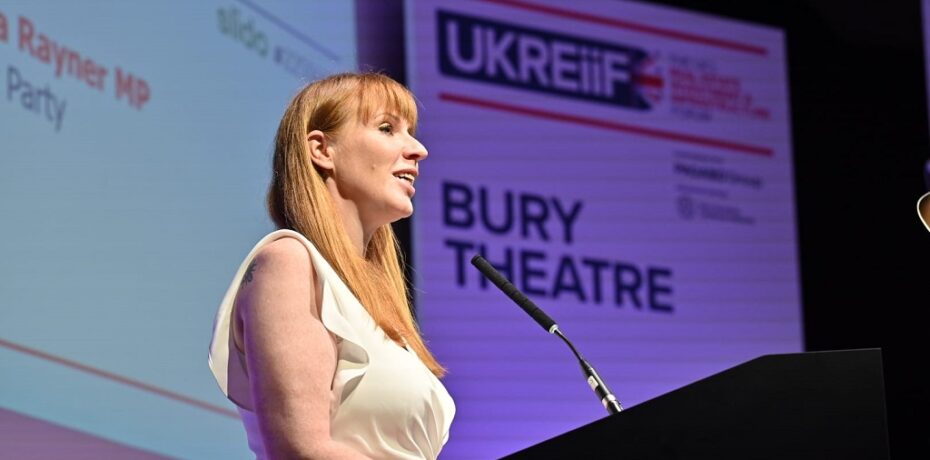The Subplot
The Subplot | Why hopes are not exactly high for the property sector under Labour
Welcome to The Subplot, your monthly slice of commentary on the business and property market from across the North of England and North Wales.
The next edition will be on Thursday 4 July.
THIS MONTH
- Angela’s ashes: the property industry thinks Labour’s manifesto may be hard to deliver, if Angela Rayner’s recent UKREiiF speech is any guide
- Elevator pitch: your guide to what’s going up, and what’s heading the other way
ANGELA’S ASHES
Rayner’s property plans may be hard to deliver
The Labour manifesto will be published next week. It follows Labour deputy leader Angela Rayner’s warm response from the UKREiiF convention in Leeds. What should we expect in the manifesto, and what will the property industry be looking out for?
There’s still a month to go, we’ve had just one leader’s TV debate, and there’s still everything to play for. Even so, the property industry – and almost everyone else – thinks they know the outcome of the 4 July general election. The Labour manifesto will be revealed next week and the property section is likely to follow the outlines of deputy leader Angela Rayner’s speech to the UK’s Real Estate Investment and Infrastructure Forum event in Leeds, a speech delivered the day before Rishi Sunak called the election. So what can we expect?
Angela said
Things to notice: the re-introduction of local housing targets (an innovation of the 2010-2015 coalition government, then removed by Michael Gove), a commitment to “build beautiful new settlements right across the UK,” inspired by the New Town’s movement and garden suburbs like Hale in Manchester and Roundhay in Leeds; aiming for 40% social and affordable housing, and some new powers for city region mayors.
“We’ll give mayors the tools they need to deliver homes in their areas, revitalising brownfield first, unlocking ugly, disused Grey Belt land for housebuilding and setting tough new conditions for releasing that land,” Rayner said. There were also promises to end residential leasehold. What there wasn’t – almost the most interesting of all – was any mention of rent controls. Read the full speech.
Risks
“We’ll end the medieval leasehold system, with root and branch reform, and we will build the houses that the next generation so desperately needs,” said Rayner, saying more or less what the outgoing Conservative Secretary of State Michael Gove said exactly a year earlier. Gove failed to get this into law, and the experts Subplot has spoken to reckon Rayner will fail too, and for the same reason.
For the record, that’s not because it’s a bad idea, not because the dark forces of vested interests will bring her down, and not because there aren’t viable alternatives (commonhold is an option, and Scotland manages fine with just freehold). No, the nub of the problem is getting from leasehold to a new alternative without, in the meantime, causing mayhem.
Very brave, minister
Labour has already stepped back from the idea of abolishing leasehold in the first 100 days and the smart money says this may be an issue for the second parliament.
“Any move to commonhold will require a thoughtful transition away from leasehold, because millions of flats are on leases, and the challenge is taking that seriously,” the British Property Federation’s policy director Ian Fletcher tells Subplot.
“Get it wrong and you risk devaluing leaseholds, hurting leaseholders’ ability to sell or get mortgages. It’s going to be a delicate business moving from one system to another.”
The consensus among Subplot’s contacts is the risk of dire unintended consequences is high enough to deter all but the bravest ministers.
New what?
Next up, new towns. There’s a lot of wobble in the language, here. Are there to be new towns, or urban extensions, or new settlements, or what? The advantage of implying new towns, rather than urban extensions, is that urban extensions mean building on the green urban fringes of towns, which upsets swing voters. In contrast, new towns are always somewhere else, definitely not on your doorstep, and therefore a safer electoral bet. Supposing Rayner really did mean new towns, the idea isn’t wildly popular.
Interesting idea
Simon Bedford is a Manchester-based strategic advisor at Deloitte, and a veteran of a thousand planning struggles. “The new towns is an interesting one. At a high level I am not sure it’s a great idea,” he says.
“The challenge with new towns is that I suspect a lot of them will not be in the North and, whilst you might get the private sector to pay, what if they don’t, or need a ‘ top up’ via transport investment to open up greenfield site? That could divert much-needed investment from the North. So I am a bit on the fence.”
Word is that a Labour government would run some kind of competitive process among developers: Bedford says it will be “interesting to see what transpires.”
Show us the money
CBRE and Cushman & Wakefield seem similarly cool because if the government is promising not to raise taxes, and can’t borrow much more, it can’t offer much help to new towns. And without it, nothing, nada, zilch.
“It is likely that [new settlements] will need to be supplemented by more patient public sector models at the start of development,” says Stephen Miles, Cushman & Wakefield’s head of land, development, and planning in the North. Iain Jenkinson, head of national planning at CBRE agrees. “The pre-requisite of any new town has been strong state leadership and funding,” he says.
Trams instead
The killer blow is delivered by Colliers’ head of residential Andrew White, who reckons the whole thing’s probably dead in the water. A complicated planning system that can’t easily be uncomplicated, massive land prices, huge infrastructure costs: they all militate against it. Asked to rate the likelihood of new towns on a scale of one to 10, White suggests zero.
“It’s never going to happen because all the money will be spent upfront on planning inquiries,” he says. He’d prefer support for existing cities, rather than new towns. “It’d love to hear a government say they would invest in towns and cities they think could thrive – then support them with great infrastructure. Why can’t Leeds have its metro?”
Woof woof
The dog that did not bark is rent controls. This idea has occasionally been promoted by big city region mayors like Andy Burnham. City region mayors have good political reasons for positioning themselves at a distance from Keir Starmer, particularly if they harbour political ambition, and maybe that’s what’s going on here. In which case, calls for rent controls are more about performance than policymaking. A lot of property people think that’s what’s going on.
Don’t go continental
At least, they hope so, because it’s not an idea they like. They point out that European residential markets often have rent controls, but those markets make a poor comparison because they’ve always operated on different principles. Those with a property model closer to England’s provide less encouraging examples. Google rent controls and Dublin, advised many sources. Also google Scotland.
“HUB’s experience of the emergency rent control legislation in Scotland has not been positive,” says the developer’s chief executive Robert Sloss. “For example, we have high-quality, consented schemes in Edinburgh, a city with a severe lack of housing, that have stalled as a direct result of the rent control legislation.”
The worst kind of rent control would be the kind that allowed city region mayors to impose them in their patch, but left a doughnut of hinterland uncontrolled. Boundary hopping could cause massive disruption. Shadow chancellor Rachel Reeves has appeared to give this idea some oxygen.
We heart council houses
Everyone Subplot spoke to agreed that a vast increase in the supply of rent-controlled social housing is a brilliant idea, that governments used to build such things, stopped doing it, and should do it again. In the meantime, the government could change housing association funding rules to make much more cheap housing available. “They have the power to provide more low-cost housing themselves, so why don’t they do it?” said one frustrated source. Labour rejected rent controls as recently as last year, and the betting is that it’s not going to be in the manifesto.
Place your bets
Is the property business being wishful? Will a new government – with a huge mandate and 14 years of frustration to work out of its system – find ways to achieve what others could not? Does the future have to be limited by the past? We may soon discover.
Subplot approached the Labour Party to talk about property policy, but didn’t hear back. But for now, if you want to gamble on the contents of the Labour manifesto, or to play property policy bingo, it might be best to opt for the safe bets: reforming the planning system and restored local authority housing targets.
 ELEVATOR PITCH
ELEVATOR PITCH
What’s going up, and what’s going down
Manchester office sale prices begin to look up, but the magic word “digital” may have outlived its usefulness. It’s a funny old world, so mind the doors, going down.
 Digital developments
Digital developments
Who says levelling up funding doesn’t deliver? The Doncaster Town Deal fund is behind plans for a 52,000 sq ft office block next to Doncaster station. Work on site is to start next year, the fund’s local board and Doncaster City Council have announced. Willmott Dixon is the contractor. The aim is to create a new specialist digital tech hub, hoping digital and tech companies decide Doncaster is their place to grow. Artificial intelligence got a prominent name-check in the publicity.
Doncaster has lots of upsides, and a station with a fast track to everywhere is one of them. The trouble is that ‘digital, tech, and AI’ is now a bandwagon so absolutely overloaded with everyone it’s hard to see it rolling anywhere. Sheffield has its digital campus, Halifax its digital skills hub, the list goes on, and it has been the go-to answer to “how will our economy survive?” for years – in 2021 the projection was for 42,000 new Yorkshire digital jobs by 2025.
It sounds a lot, but there are 1.1m people in work in West Yorkshire alone, so in reality it’s trivial. And even that gentle tide may be turning. One source suggests the volume of digital vacancies in Yorkshire is plunging, down 21% in the first six months of 2024. Maybe it’s time to think of a new marketing angle?
 Offices
Offices
We all know that commercial office property values have taken a hit. The evidence begins to emerge that the bruise is getting less sensitive.
This week Aviva Life and Pensions decided to offload the 55,400 sq ft block at 55 Spring Gardens, Manchester, Place North West reported. The price tag is £15m, which is way down on the £20.5m Aviva paid CBRE Investors in 2017 but not so far off what CBRE is understood to have paid in 2015. Swings and roundabouts, but in this case fairly gentle. We’ve seen much heftier discounts in the last two years, and there’s scope here for new owners to indulge in what is euphemistically called “active asset management.”
Refurbishment would be a good idea – and the price reflects that. So whilst this looks like a hefty haircut, it’s really a sign that the market is looking up.
Get in touch with David Thame: [email protected]





